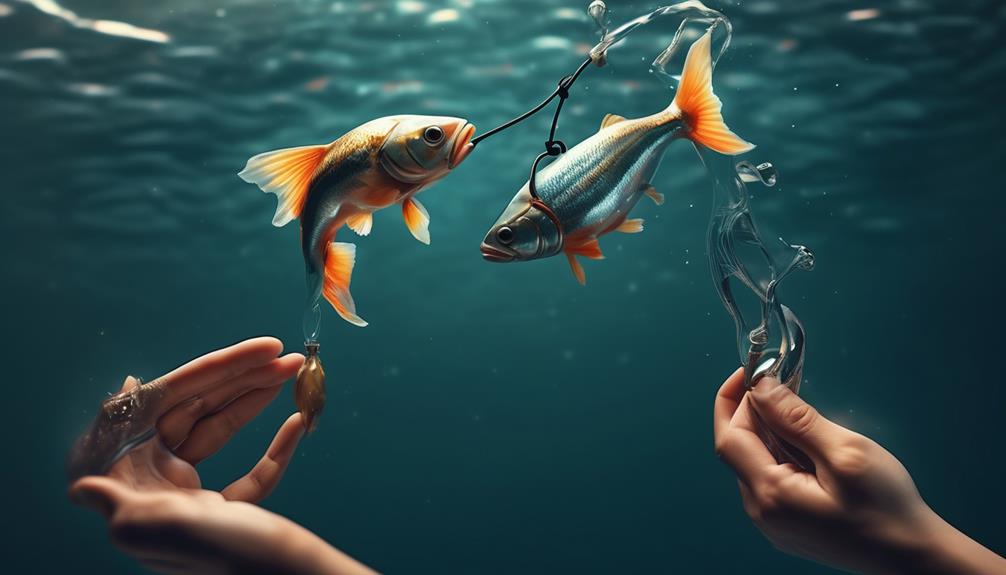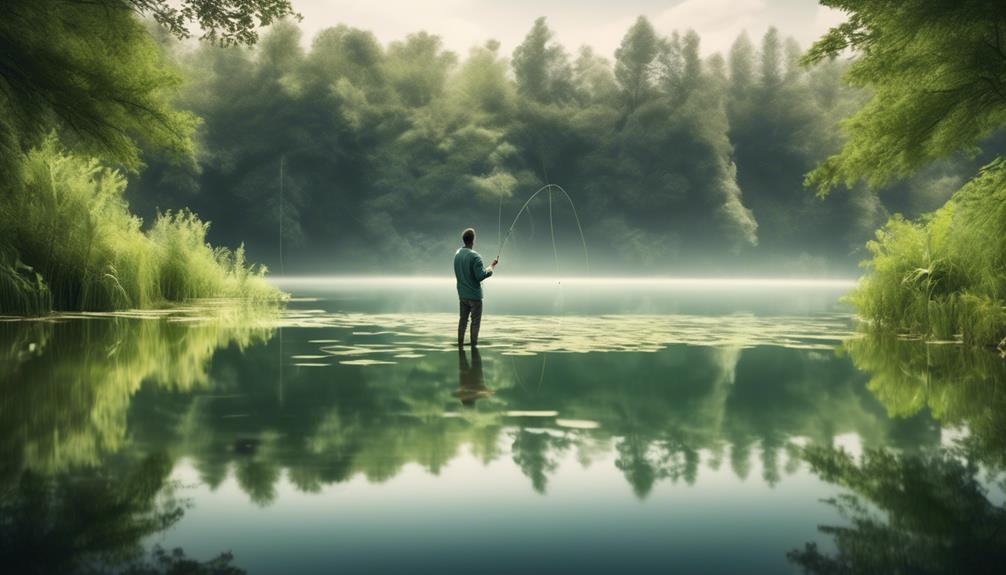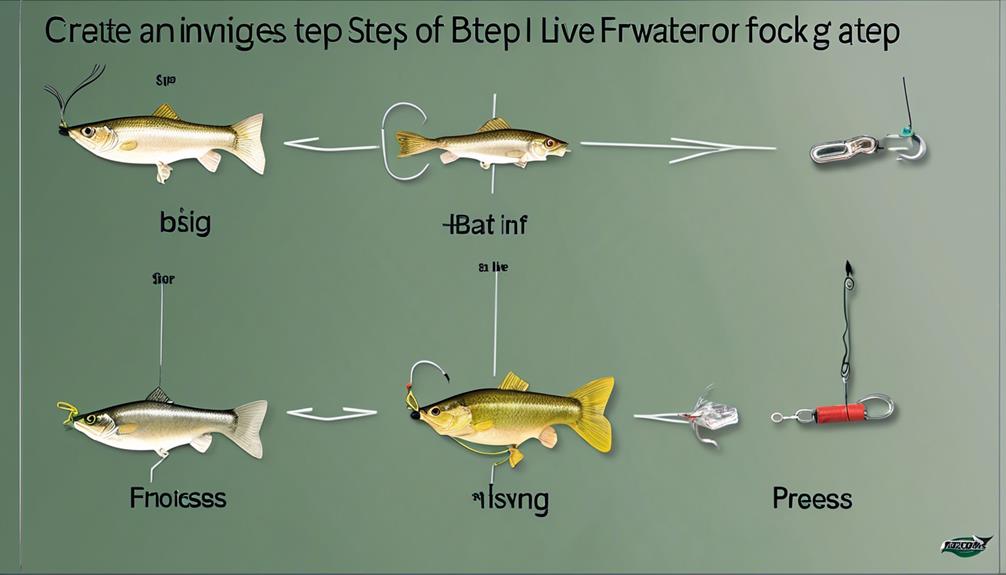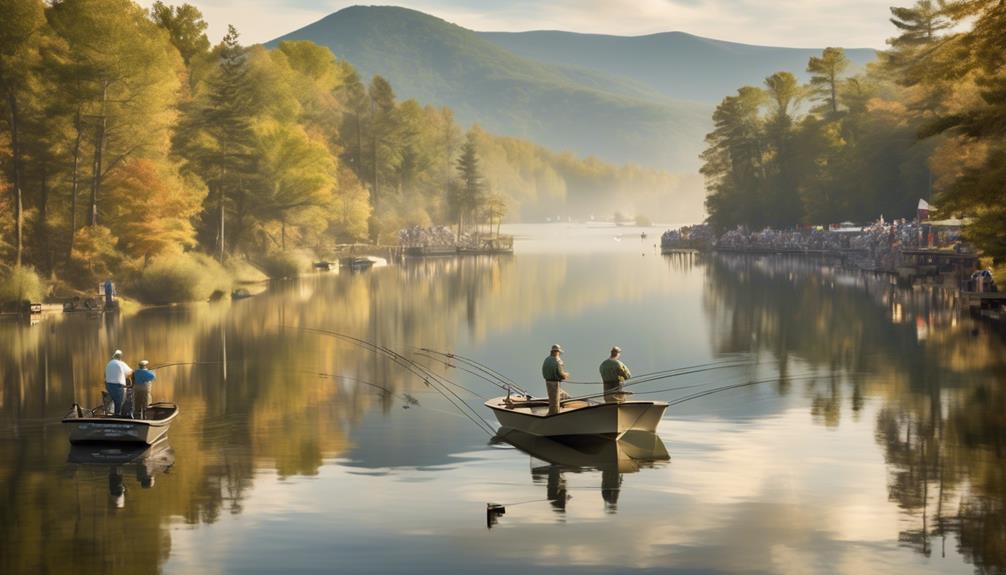Ever wondered why starting with these freshwater fishing tips is crucial for beginner anglers?
You might have heard various opinions on the matter, but the truth is, mastering the basics can significantly impact your success on the water.
From understanding the behavior of freshwater fish to selecting the right gear and techniques, these foundational tips can lay the groundwork for a fulfilling and rewarding fishing experience.
So, before you head out to your favorite fishing spot, consider the valuable insights these tips can provide to enhance your angling skills and increase your chances of a successful catch.
Essential Gear for Freshwater Fishing
To ensure a successful freshwater fishing trip, it's essential to have the right gear. Your fishing gear and tackle selection play a crucial role in determining your angling success.
When it comes to fishing gear, having a reliable rod and reel is imperative. Consider the specific type of fish you'll be targeting and choose a rod and reel combination that matches the size and behavior of your intended catch. For instance, if you're aiming for smaller fish like trout, a light spinning rod and reel would be suitable. On the other hand, if you're after larger species such as bass or pike, a medium to heavy baitcasting rod and reel might be more appropriate.
In addition to the rod and reel, your tackle selection is equally important. Different types of fish require different types of bait and lures. Make sure to pack a variety of hooks, sinkers, and artificial baits to cater to various fishing conditions and preferences of the fish. It's also essential to have a well-organized tackle box to keep your gear neat and easily accessible. This will save you time and frustration while out on the water.
Furthermore, don't forget to bring along a suitable fishing line. The fishing line's strength and material should align with the type of fish you're targeting and the environment you'll be fishing in.
Best Fishing Spots for Beginners
When you're just starting out in freshwater fishing, finding the best spots to cast your line can greatly impact your angling success. As a beginner, it's important to look for easily accessible fishing spots with calm waters and abundant fish populations. Local ponds and lakes are great options, as they often have designated fishing areas and are stocked with various freshwater species. These spots provide a comfortable environment for beginners to practice their skills without the challenges of rough currents or deep waters.
Fishing etiquette is crucial, especially for beginners exploring new fishing spots. Always be mindful of other anglers and their space, and adhere to any posted regulations. It's important to leave the area clean and undisturbed, respecting the natural surroundings and wildlife. Additionally, familiarize yourself with local conservation efforts and regulations to ensure that you're fishing responsibly and contributing to the sustainability of freshwater ecosystems. By following these guidelines, you can help preserve the natural beauty of fishing spots for future generations to enjoy.
As you venture into new fishing spots, consider joining local fishing clubs or engaging with experienced anglers who can provide valuable insights and tips. These connections can lead you to hidden gems and lesser-known spots that are ideal for beginners. Remember, the journey of discovering the best fishing spots is just as rewarding as the catch itself. Happy fishing!
Choosing the Right Bait and Lures
Selecting the appropriate bait and lures is essential for attracting and catching freshwater fish effectively. When it comes to freshwater fishing, the right bait and lure selection can make all the difference in your success. Here are some key points to consider when choosing the right bait and lures:
- Lure Selection: The type of lure you choose can greatly impact your fishing experience. Different lures are designed to mimic specific types of prey, so it's important to consider the natural diet of the fish you're targeting. For example, if you're aiming to catch bass, using a crankbait that imitates a small fish could be effective. On the other hand, if you're going after trout, a spinner or spoon lure mimicking insects or small baitfish might work better. Understanding the behavior and feeding habits of your target fish will help you select the most appropriate lure.
- Bait Presentation: How you present your bait can significantly influence your catch. Pay attention to the way your bait moves in the water and adjust your presentation accordingly. Some fish prefer a lively, erratic movement, while others may respond better to a more subtle, natural presentation. Experimenting with different retrieval speeds and movements can help you find the most effective bait presentation for the specific fish species you're targeting.
- Matching the Hatch: Observing the natural food sources available to the fish in the area can guide your bait and lure selection. Matching the hatch involves using bait and lures that closely resemble the insects or smaller fish that the target species typically feed on. This approach can increase your chances of enticing a bite, as it presents the fish with something familiar and appetizing. Keep an eye on the water and shoreline to identify the prevalent food sources, and choose your bait and lures accordingly.
Choosing the right bait and lures is a crucial aspect of freshwater fishing, and paying attention to lure selection and bait presentation can significantly improve your chances of a successful fishing trip.
Understanding Freshwater Fish Behavior
Understanding freshwater fish behavior plays a crucial role in increasing your chances of a successful fishing trip. When it comes to fish feeding, it's important to note that different species have varied feeding habits. Some fish are more active feeders during specific times of the day, such as early morning or late evening, while others may feed throughout the day. Observing the behavior of the fish in the specific water body you're fishing in can provide valuable insights into when they're most likely to be feeding.
Another crucial factor to consider is water temperature. Fish are ectothermic, meaning their body temperature is regulated by the surrounding water. As a result, water temperature significantly influences their behavior and feeding patterns. For instance, in colder water, fish tend to have a slower metabolism, which can decrease their activity and feeding. On the other hand, warmer water can lead to increased metabolic rates and heightened feeding activity.
Understanding these behavioral patterns can help you strategically plan your fishing trip. By targeting your fishing times based on when the fish are most active and adjusting your bait and lure choices accordingly, you can significantly improve your chances of a successful catch. Additionally, being mindful of water temperature can guide your decisions on where to fish within a water body, further enhancing your overall fishing experience.
Basic Casting Techniques to Master
To improve your freshwater fishing skills, mastering basic casting techniques is essential for effectively presenting your bait or lure to the fish. Whether you're a novice angler or looking to brush up on your skills, honing your casting technique will greatly enhance your chances of a successful fishing trip. Here are some fundamental casting techniques to help you improve your freshwater fishing game:
- Reel Control: Proper control of your reel is crucial for accurate and efficient casting. Mastering your reel control involves understanding the tension and speed at which the line leaves the spool. This skill allows you to cast with precision and target specific areas where fish are likely to be.
- Line Management: Managing your line effectively is key to avoiding tangles and ensuring smooth casting. Understanding how to hold and release the line during casting, as well as managing the line's slack, will significantly improve your overall casting performance.
- Casting Accuracy: Practice casting accuracy by aiming for specific targets in the water. Hitting your desired spot increases the chances of attracting fish to your bait or lure. Focus on maintaining a consistent and smooth casting motion to improve your accuracy.
Safety Tips for Freshwater Anglers
When fishing in freshwater, prioritize your safety by being aware of potential hazards and taking necessary precautions to prevent accidents. Water safety is paramount when angling in freshwater. Always wear a personal flotation device (PFD) when on a boat, especially if you're fishing alone. Even if you're a strong swimmer, unexpected incidents can occur. It's also crucial to check the weather forecast before heading out, as sudden storms can be dangerous on the water. Additionally, be cautious when wading in rivers or streams, as water currents can be deceivingly strong. Always inform someone of your fishing plans and expected return time, especially if you're going to a remote area.
Fishing ethics also play a significant role in safety. Respect other anglers' space to avoid potential confrontations. It's important to remember that everyone is out there to enjoy the peacefulness of nature. Additionally, always follow local regulations and catch-and-release guidelines to preserve the freshwater ecosystem. Using barbless hooks, handling fish with wet hands, and minimizing the time fish spend out of the water are all crucial practices for ethical angling. Furthermore, properly dispose of any trash and fishing lines, as these can harm wildlife and create hazards for other anglers.
Proper Fish Handling and Release

Using proper fish handling techniques is essential to ensure the safe release of fish back into the water. When practicing catch and release techniques, it's important to prioritize fish conservation and their well-being. Here are some tips for proper fish handling:
- Use Barbless Hooks: Using barbless hooks can make it easier to remove the hook from the fish's mouth, reducing potential injury and stress to the fish during the release process.
- Minimize Air Exposure: Keep the fish close to the water's surface and minimize the time it spends out of the water. This helps prevent overexertion and reduces the risk of injury to the fish's gills.
- Handle with Care: When handling the fish, wet your hands to avoid removing its protective slime layer, which helps prevent infections and diseases. Support the fish gently and avoid squeezing it tightly, as this can cause internal damage.
Tips for Conserving Freshwater Habitats
Consider implementing habitat conservation practices to support the health and sustainability of freshwater ecosystems. Habitat protection and conservation efforts are crucial in maintaining the delicate balance of freshwater habitats.
One of the most effective ways to conserve these habitats is by actively participating in local conservation initiatives. By volunteering your time or donating to organizations dedicated to freshwater habitat conservation, you can directly contribute to the preservation of these vital ecosystems.
Another essential aspect of habitat conservation is ensuring the quality of water in freshwater habitats. Pollution and other human activities can significantly impact water quality, which in turn affects ecosystem health. Simple actions such as properly disposing of household chemicals, reducing the use of fertilizers and pesticides, and minimizing runoff from driveways and sidewalks can all contribute to maintaining water quality in freshwater habitats.
Moreover, being mindful of your water usage at home can indirectly benefit freshwater habitats. Conserving water reduces the strain on freshwater sources, ensuring that an adequate amount of water remains in these ecosystems to support the diverse array of species that depend on them for survival. Small changes, like fixing leaks and using water-efficient appliances, can collectively make a significant difference in preserving freshwater habitats.
Frequently Asked Questions
What Are the Best Times of Day to Go Freshwater Fishing?
The best times of day to go freshwater fishing are early morning and late evening. That's when the fish are most active. Use the best equipment and fishing techniques, and you'll have the most success.
How Do I Know if a Fishing Spot Is Safe and Legal to Fish In?
Before casting your line, ensure safety regulations are met. Check for legal requirements at fishing spots. Verify if the location is safe and legal to fish in. Respect the rules to protect the environment and others.
What Are Some Common Mistakes That Beginners Make When Choosing Bait and Lures?
When choosing bait and lures, common mistakes as a beginner include not understanding fish behavior, using the wrong tackle, and neglecting water conditions. Learn about proper casting, hook setting, and line management for successful fishing techniques.
Are There Any Specific Freshwater Fish Species I Should Be Aware of When Fishing in Different Locations?
When fishing in different freshwater locations, be aware of specific fish species. Research local regulations, use proper bait and lures, and adapt fishing techniques. Regularly maintain gear for successful angling experiences and conservation efforts.
How Can I Properly Maintain and Care for My Fishing Gear to Ensure It Lasts a Long Time?
To properly maintain and care for your fishing gear, follow these gear care tips. Clean your equipment after every use, store it in a dry place, and regularly inspect for any damage. Proper equipment maintenance ensures gear longevity.
Conclusion
So, next time you head out for a freshwater fishing adventure, remember to pack the essential gear, choose the right spot, bait, and lures, understand fish behavior, master basic casting techniques, prioritize safety, handle and release fish properly, and conserve freshwater habitats.
By following these tips, you'll be well-prepared to enjoy a successful and responsible fishing experience.
Happy fishing!



